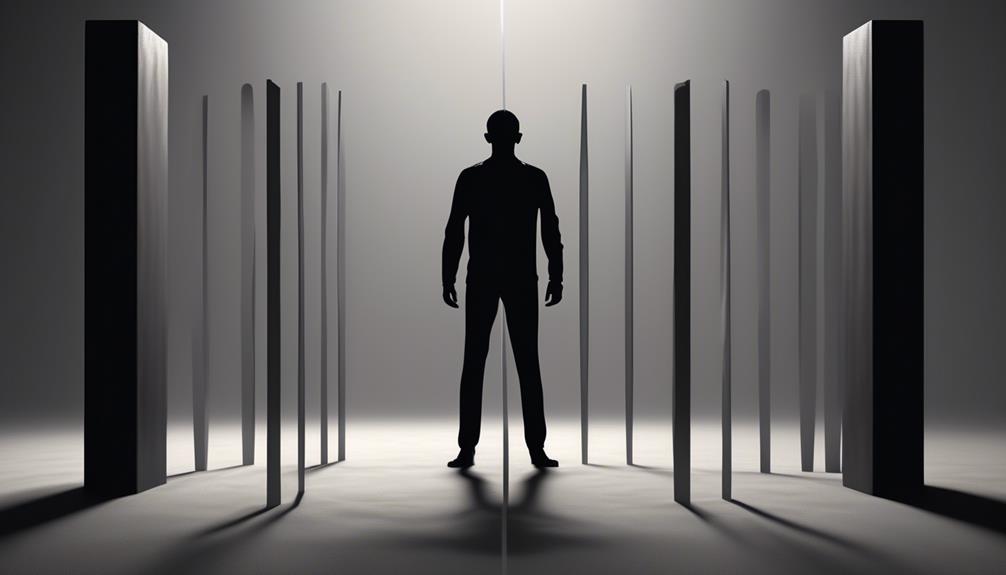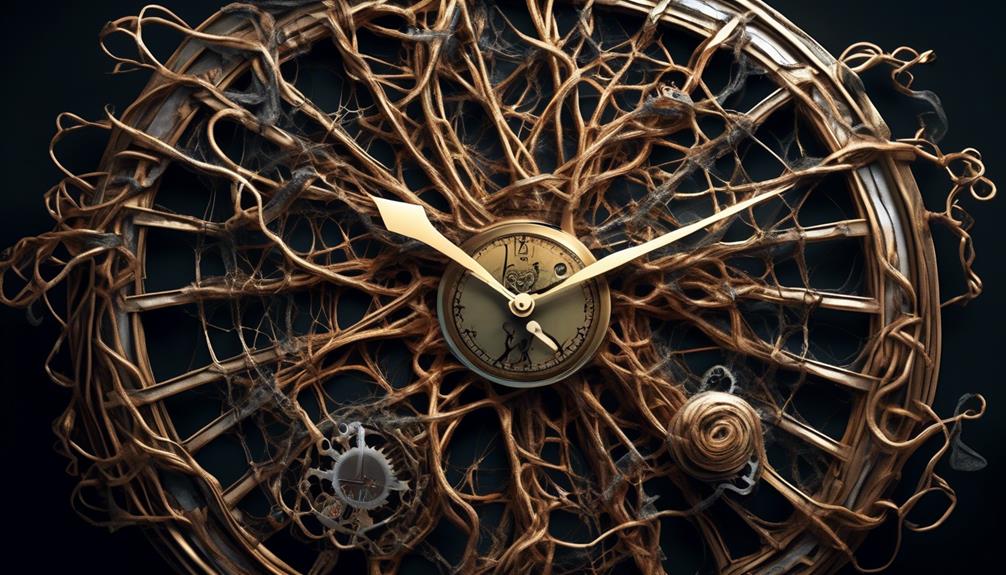Beginning a relationship with someone diagnosed with Borderline Personality Disorder (BPD) can be likened to navigating a intricate maze, full of surprising twists and turns at every corner.
The journey is fraught with emotional challenges and uncertainties that can leave us feeling drained and unsure of ourselves. However, despite the difficulties, there are important aspects to consider when contemplating embarking on such a relationship.
Key Takeaways
- Understand BPD symptoms before committing.
- Prioritize mental well-being and self-care.
- Establish clear boundaries to navigate relationship challenges.
- Seek professional therapy support for stability and guidance.
Risks of Dating Someone With BPD
Why do individuals face significant risks when dating someone with Borderline Personality Disorder (BPD)?
Dating a person with BPD can be challenging due to their mental health issues, which manifest in intense mood swings and an emotional rollercoaster. The constant fear of abandonment experienced by individuals with BPD can lead to relationship insecurity, making it difficult to establish a stable and trusting connection.
Moreover, impulsive behaviors and self-sabotage tendencies in BPD can disrupt the harmony of the relationship, causing distress for both partners. Communication difficulties arising from emotional dysregulation further complicate interactions, making it hard to address issues effectively.
The emotional intensity that often characterizes relationships with individuals with BPD can overwhelm partners, leaving them feeling drained and uncertain about the future of the relationship. Understanding these risks is crucial for anyone considering dating someone with BPD, as it requires patience, empathy, and a willingness to navigate the complexities of the condition.
Challenges in BPD Relationships

Navigating a relationship with someone who has Borderline Personality Disorder (BPD) presents unique challenges due to the intense mood swings and emotional fluctuations characteristic of the condition. In a healthy relationship with someone who has BPD, setting clear boundaries and seeking therapy are crucial. The emotional intensity experienced in BPD relationships can be overwhelming, requiring both partners to practice clear communication consistently.
| Challenges in BPD Relationships | Description |
|---|---|
| Intense Emotions | BPD relationships often involve extreme emotional highs and lows, requiring emotional regulation. |
| Setting Boundaries | Establishing and maintaining boundaries is essential in managing the intensity of the relationship. |
| Seeking Therapy | Therapy can help individuals with BPD learn coping mechanisms and improve relationship dynamics. |
| Emotional Intensity | The emotional intensity in BPD relationships can create challenges in maintaining stability. |
| Clear Communication | Effective communication is key to navigating the complexities of emotions in a BPD relationship. |
Impact on Mental Health
Dating someone with Borderline Personality Disorder (BPD) can significantly impact mental health, leading to emotional turmoil and potential manipulation. When involved with a person with borderline personality, one may experience a range of mental health challenges:
- Self-Esteem Issues: Constant criticism or idealization from a person with BPD can create doubts about oneself, affecting self-worth.
- Social Isolation: The rollercoaster of emotions and behaviors in the relationship can lead to withdrawing from social circles, causing isolation.
- Emotional Trauma: The intense ups and downs in the relationship can cause emotional trauma, affecting mental well-being.
- Anxiety and Depression: Managing the instability and unpredictability in a relationship with someone with BPD can contribute to feelings of anxiety and depression.
Navigating these complexities can be overwhelming, underscoring the importance of seeking professional support to safeguard one's mental health when dating an individual with BPD.
Boundaries and Self-care

When dating someone with Borderline Personality Disorder (BPD), setting clear boundaries is crucial for maintaining a healthy and balanced relationship. Establishing these boundaries not only protects your mental and emotional well-being but also supports your partner in managing their BPD symptoms effectively. Here are some key strategies for navigating a relationship with a partner who has BPD:
| Boundaries | Self-Care | Communication |
|---|---|---|
| Define what is acceptable behavior and what is not. | Prioritize activities that promote your well-being. | Maintain open and honest discussions about needs and concerns. |
| Communicate boundaries clearly and consistently. | Practice mindfulness and stress-reducing techniques. | Listen actively and validate your partner's emotions. |
| Revisit and adjust boundaries as needed. | Seek support from friends, family, or therapists. | Set aside dedicated time for meaningful conversations. |
Considerations Before Starting a Relationship
Considering the challenges and complexities that may arise, it's important to carefully evaluate the implications of starting a relationship with someone who's Borderline Personality Disorder (BPD).
- Understanding BPD Symptoms: Educating oneself about the symptoms of BPD, such as intense mood swings and fear of abandonment, can provide insight into the experiences of the individual with BPD.
- Managing Emotional Intensity: Recognizing and addressing the emotional intensity that often accompanies individuals with BPD can help in fostering a supportive and stable relationship.
- Setting Clear Boundaries: Establishing clear boundaries and communicating them effectively is crucial to navigate impulsive behaviors and maintain stability in the relationship.
- Seeking Professional Help: Considering the complexities of BPD, seeking professional guidance from therapists or counselors experienced in treating BPD can provide valuable support and guidance for both partners.
Frequently Asked Questions
Why Shouldn't You Date Someone With Bpd?
Dating someone with BPD can be challenging due to intense emotions and fear of abandonment. Their impulsive actions and unstable relationships may cause distress. Understanding the disorder is crucial for managing communication and emotional stability in the relationship.
Symptoms like self-sabotage and emotional dysregulation can strain relationships, leading to conflicts. Partners may find it difficult to set boundaries and handle the emotional demands. It's important to approach such relationships with empathy and awareness.
What Is the Trauma of Dating Someone With Bpd?
Dating someone with BPD can lead to intense emotional turmoil and instability in the relationship. The rollercoaster of mood swings and unpredictable behavior can result in feelings of manipulation, gaslighting, and emotional abuse.
This can cause self-esteem issues, social isolation, and emotional trauma, leading to a constant fear of negative reactions. Seeking therapy is crucial for coping with the impact of such relationships.
Can You Have a Healthy Relationship With Someone With Bpd?
We believe that having a healthy relationship with someone with BPD is possible. Understanding, support, therapy, and communication play vital roles.
Setting boundaries, practicing empathy, and building a strong support system are crucial. Seeking professional help can enhance relationship quality.
With effort, patience, and a collaborative approach, maintaining a healthy relationship with someone with BPD can be achieved. It requires dedication and a willingness to grow together.
Why Do Borderlines Hurt the Ones They Love?
When individuals with BPD hurt loved ones, it's like a storm brewing within, flooding emotions that overflow. Their intense fear of abandonment can trigger behaviors that unintentionally harm those closest to them.
Despite good intentions, struggles with emotional regulation and communication challenges can lead to hurtful actions. Understanding these dynamics and offering support can help navigate the turbulent waters of loving someone with BPD.
Conclusion
In conclusion, dating someone with BPD can present significant challenges and risks that may impact your mental health and well-being. It's essential to carefully consider the implications before entering into a relationship with someone who's BPD.
However, despite the difficulties, understanding, empathy, and support can make a difference in navigating the complexities of such relationships. Remember, every individual and relationship is unique, and with the right approach, there's hope for growth and healing.









